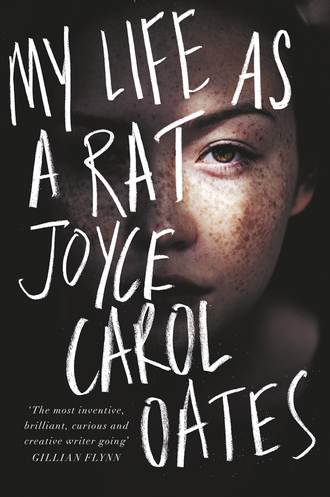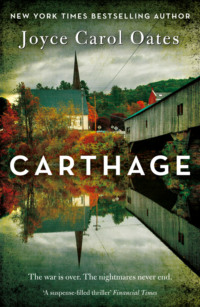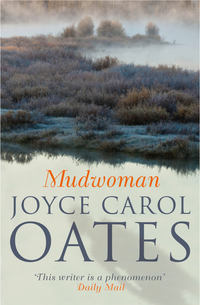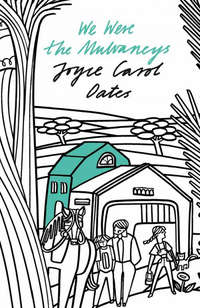
Полная версия
My Life as a Rat
Oh, God. Help me!
I adored my mother but also, I guess I hated her. More and more, as I grew older and Mom seemed never to change except to become more exasperatingly herself.
After the TV news we went away stunned. It was as if a fire were burning somewhere in the house, no one knew where. I could hear Katie’s bewildered voice and Miriam telling her sharply just be still, not to bother Mom.
I wanted to tell them: I knew much more than they did. Our brothers had entrusted me with a secret as they had not entrusted them.
For seven hours my father remained with Jerr and Lionel at police headquarters as they were being interviewed. (Not “interrogated,” since they had not—yet—been arrested.)
Initially, my brothers denied any involvement with Hadrian Johnson, at any time.
Then, Jerr conceded that just possibly he’d struck something, or someone, driving on Delahunt Road on Saturday night. And he’d been drinking—a few beers. And maybe speeding, a few miles over the forty-five-mile-an-hour limit.
Definitely, he’d heard a thud. He and Lionel both. Looked in the rearview mirror but didn’t see anything, guessed it might’ve been a deer, or a bicycle abandoned at the side of the road.
Had anyone else been with them?—my brothers were asked.
At first, reluctant to give the names of the other boys. For they were not the kind of guys to rat on their friends.
At first, shaking their heads no.
Though soon, after repeated questions, and Daddy’s increasing impatience, they acknowledged yes—there were two other guys with them, in the backseat of the car.
And so, my brothers did “rat” on their friends after all. (Would this be held against them?—it did not seem so.)
I would wonder when our father was told by police officers about Hadrian Johnson—what had been done to him, what condition he was in; when this had happened, and what a witness had reported.
When Daddy had no choice but to realize that the trouble his sons were in wasn’t just a hit-and-run accident.
After seven hours Daddy was allowed to bring my brothers back to the house. They had not (yet) been arrested. They had been warned, and had agreed, not to leave South Niagara but to be available for further questioning as soon as the next day.
It was after 9:00 P.M. They were exhausted, and they were starving. In the kitchen they ate the supper Mom had prepared for them, kept warm in the oven. No one else was welcome in the room though we were all told—by Daddy, for Mom could not bear to speak—that there’d been a “misunderstanding” by the South Niagara police—a “misidentification”—that would be straightened out in the morning, with the lawyer’s help.
Rick asked if it had anything to do with Hadrian Johnson getting beaten and Daddy said angrily no it did not.
What we could see of our older brothers, they were looking fatigued, grim. Their jaws were dark with stubble and their eyes were rimmed with shadow. Lionel didn’t smirk as he usually did if someone was looking at him more intently than he liked and Jerr ignored us altogether.
Katie and I went to bed, later than our usual hour. And in our beds we lay unable to sleep. Katie said, “I guess Jerr and Lionel are in some kind of trouble from the other night. With Jerr’s car? You think—they were drinking?”
Of Hadrian Johnson she did not speak, as if she’d forgotten him.
And I’d forgotten him, too. And the baseball bat.
Strange to be lying beneath a warm comforter, in flannel pajamas, shivering. So hard, my teeth were chattering.
And my head was aching, as it sometimes did when I lay down, my head on a single pillow; too much blood rushed into it. Badly I wanted to just lie there in the dark, not having to see another person, not having to hear another person speak and not having to speak myself. Not having to think about anything that was upsetting, frightening.
What is it? Why?
AT FIRST I THOUGHT IT WAS WIND SCRAPING BRANCHES AGAINST the roof of the house then I understood it was Daddy speaking with my brothers in the kitchen below. His voice was low and urgent, their voices were murmurs. At times it sounded as if he was giving them instructions, and at times it sounded as if he was pleading with them. And then his voice was abrupt, as if he was interrupting them. I could not hear words distinctly, for the pounding of my heart.
I was sick with the knowledge of what Jerome and Lionel had done even as I could not quite understand what they had done for still I was thinking of Niagara Falls … I had no wish to eavesdrop now. Never would I eavesdrop on anyone again.
It was frightening to me, I did not think that I could lie, if I was questioned about my brothers. If police officers questioned me.
I could not lie very convincingly to my brothers and sisters, and I could not lie at all to any adult. I would have to tell the truth. As, in confession, I made an effort to list the “sins” I’d committed, which included sins of omission. If the priest asked me—What are you not telling me, my dear? What is your secret? If one of my teachers asked me—What is it, Violet?—that you should be telling police?
Through the long day at school I’d been thinking of Hadrian Johnson. Hearing his name spoken, seeing his picture. His face on the front page of the South Niagara Union Journal. Your first thought is he’s an athlete, he has brought some sort of acclaim to South Niagara, a championship, a scholarship. But then you see the headline.
LOCAL YOUTH, 17, SAVAGELY BEATEN
Attack on Delahunt Rd., Police Search for Assailants
Jerr had stayed the night, in his old room he’d shared with Lionel. I wondered if the two were awake as I was awake and if they spoke together or had lapsed into silence, exhausted. I wondered what they were thinking. If they were thinking.
Though I knew better I wondered if somehow it was true—true in some way—that there’d been a “misunderstanding”—a “misidentification.”
Already my brothers had a lawyer. So quickly, Daddy had known to, as he’d say sardonically of others, lawyer up.
In Daddy’s world, to lawyer up was to admit guilt. Usually.
But you needed a lawyer, if you were accused of anything. Under the law you were innocent until proven guilty and only a lawyer could guide you through the process of such proof.
As the lawyer had protected my brothers and the other boys from serious consequences, at the time of Liza Deaver.
In a paralysis of dread I lay with my hands pressed over my ears as my father continued to question my brothers almost directly below my bed. I wondered if in my parents’ bedroom at the end of the hall my mother too was lying awake, unable to sleep, listening for sounds—footsteps on the stairs, a softly closing door—that the ordeal was over, for the night.
Whatever Daddy was asking my brothers, they were giving him answers that were not satisfactory. This, I seemed to know.
Daddy must have been humiliated by the ordeal in the police precinct. He knew South Niagara police officers, and they knew him. He’d gone to school with some of them. Possibly, they were embarrassed for him.
Of the four boys brought in for questioning, Jerr, the oldest, would have seemed the most convincing as he was (seemingly) the most intelligent; Walt, a cousin, the son of one of Daddy’s younger brothers, would have seemed the most innocent, and the most easily led. Lionel, uneasy in his body, grown inches within the past year, with the red cut beneath his eye like a lurid wink, would have seemed the least trustworthy. And there was Don Brinkhaus with his Marine-style haircut and broad heifer-face who’d been on the varsity football team at the high school until he’d been expelled from the team for fighting two or three years ago.
Had the guys been driving on Delahunt Road, and had Jerr (unknowingly) struck something or someone on the shoulder of the road?—this was the issue. Lionel wanted to insist that nothing had happened at all. Aggrieving, whining to Daddy—We didn’t do it. We didn’t even see him. They just want to arrest somebody white.
I wondered: Did Daddy believe them?
AND I WONDERED: DID MOM BELIEVE THEM?
On the phone we heard her breathless and disbelieving: “It’s a trap. They aren’t even looking for anyone else. They think it was Jerr’s car—the one Jerome gave him. They think. But Jerr has said if he’d hit something that night, he thinks it was a deer. He’d washed off the bloodstains, he said. He’d thought it was a deer, that was what you would do, if—if it was a deer you’d hit … And they are saying, this Johnson boy, this black boy, he’d been involved in drugs. They all are … I mean, so many of them are, right in the high school. In the middle school. The dealers are in the Falls, black drug dealers in the Falls and in Buffalo, with ties to New York City. They drive expensive cars—sports cars. They wear fur coats, gold chains, diamond fillings in their teeth. They murder one another all the time and nobody cares, the police look the other way because they are on the take. It comes up from Colombia in South America, the drug—heroin, I think it is. Opium.”
And: “It was a personal connection, this ‘Hadrian Johnson’ was killed by a boyfriend of his own mother … He was beaten to death with a tire iron. They left him to die by the side of the road. The police say, the ‘murder weapon’ was thrown in the river. And this isn’t the first time, there have been other times nobody even knew about, that never got in the papers because white boys were not accused. The media has it out for white boys—you know … It’s the way it is. But we have a very good lawyer. He says, the murderer is probably Hadrian Johnson’s own mother’s boyfriend and a major drug dealer, lives in the Falls and the police never touch him, he has gotten away with murder a dozen times.”
And, later: “We just heard—it was a Hells Angels attack. ‘White racists.’ A motorcycle gang, in the Falls. They rode to South Niagara the other night, looking for blacks to kill. You see them sometimes in the daytime in military formation—roaring on their Harley-Davidsons. It could have been anyone they killed. That poor boy—‘Hadrian Johnson.’ Only in high school, and Les says he was a quiet boy, and a good basketball player, everybody liked him. People who have trouble with black kids say they’d never had trouble with him.”
A swirl of rumors, like rotted leaves in the wind. A plague of rumors and a stink of rumors and yet, nothing came of them. After several days our mother’s voice on the phone grew frantic: “… no one is supposed to know, our lawyer says it has to be kept confidential, Hadrian Johnson had gotten in a fight with another black basketball player that weekend, over a girl, and ‘sliced’ him with a knife, and the other boy threatened to kill him, and …”
Jerome Jr. and Lionel were summoned back to the police station. Walt Lemire, Don Brinkhaus were summoned. Now there were three lawyers: one for the Kerrigan brothers, one for Walt Lemire and one for Don Brinkhaus.
Yet, the boys were not arrested. So long as they were not arrested, their names would not appear in local media.
Everyone talked of them: the Kerrigans, especially. Somehow it began to be known, or to be suspected, that Jerome Kerrigan Jr. had struck Hadrian Johnson in a hit-and-run accident.
Not on purpose. Accident.
Blaming the kid more than he deserves, because he is WHITE.
Daddy insisted that Jerr move back into his old room; there’d been “racist” threats against him, and he wasn’t safe in his place downtown, Daddy believed. Lionel was informed by the high school principal that he should stay home for a while, feelings were running high between “whites” and “blacks” at South Niagara High and Lionel’s presence was “distracting.” Mom wanted to keep me home from school too but I was so upset, she relented. I could not bear to miss school—I loved school! And I was sure, I wanted to believe, school loved me.
The thought of being kept home with my mother and my brothers day after day panicked me. Trapped in the house where everyone was waiting for—what? What would save them? For someone else to be arrested for the crime?
As Mom said, “Whoever did this terrible thing. The guilty people.”
There was the hope, too, that the evidence police were assembling was only circumstantial, not enough to present to a grand jury. Especially, a jury comprised of white people. This was what the boys’ lawyers insisted.
Relatives, neighbors, friends of Daddy’s dropped by our house to show support. Fellow Vietnam veterans. At least, this was the pretext for their visit.
A call came from Tommy Kerrigan’s office, for Daddy. Not clear whether Tommy Kerrigan himself spoke to Daddy or one of his assistants.
Sometimes Mom refused to see visitors but hid away upstairs when the doorbell rang and told us not to answer it. At other times she was excited, insisting that visitors stay for meals. Female relatives helped in the kitchen. Beer, ale was consumed. There was an air of festivity. The subject of all conversation was the boys—how badly they were being treated by the police, how unfair, unjust the investigation was.
Because they are WHITE. No other reason!
The name “Hadrian Johnson” was never uttered. There was reference to the “black boy.” That was all.
Jerr and Lionel didn’t speak of Hadrian at all. It was as if the South Niagara police were to blame for their troubles, or rather the chief of police, who’d been an appointment of Tommy Kerrigan’s when Tommy Kerrigan had been mayor of South Niagara—Rat bastard. You’d think he’d be more grateful.
There may have been friends, relatives, acquaintances who believed that Jerr and Lionel were guilty of what they’d been accused of doing but these people did not visit us. Or if they did, they were circumspect in their emotional support for beleaguered Lula and Jerome.
Terrible thing. Such a tragedy. Try to hope for the best …
There was much speculation on the identity of the “anonymous witness” who’d provided the first several letters of the Chevrolet license plate. How could police be certain that he was telling the truth? Wasn’t it possible he’d deliberately misinformed them? Giving them the first few digits of Jerr’s car, to implicate Jerome Kerrigan’s son? And daring to specify Hadrian Johnson’s assailants as “white boys.”
(In the dark, how could a witness be so certain of the color of the boys’ skin? He couldn’t have had more than a glimpse of the boys at the side of the road. By his own account he’d slowed down for only a few seconds then sped up and drove away.)
(Very possibly, this “anonymous witness” was a black man himself. Involved in the beating himself …)
The phone rang repeatedly. Often Mom stood a few feet away squinting at it. She was fearful of answering blindly—not since Liza Deaver did she dare pick up a receiver without knowing exactly who was calling. If I was nearby she asked me to answer for her as she stood transfixed while I lifted the receiver and said Sorry nobody is here right now to speak with you. Please do not call again thank you!—quickly hanging up before the voice on the other end could express surprise or scold me.
One day I was alone in the kitchen after school. Staring at the phone as it began to ring. And there was Lionel beside me. Looming over me. “Don’t answer that,” he said. He spoke tersely, tightly as a knot might speak. Giving me no time to react, to move away from the phone, but rudely knocking me aside though I’d made no move to answer it.
Lionel’s mouth was twisted into a slash of a smile. He’d stayed home from school, he’d barely spoken to anyone in the family for days except our father and only then in private. Much of the time he was playing video games in his room. The cut beneath his eye had not healed, he must have been picking at the scab. His jaws were unshaven. The neck of his T-shirt was stretched, and soiled. I smelled something sharp, rank as an animal’s smell lifting from him. I laughed nervously, edging away.
Lionel said, in a jeering singsong voice: “Hey there, ‘Vi-let Rue’! Where’re you going, you!”
I eased away. I fled.
Wanting to assure my angry brother—I won’t tell Dad. Or anyone. I told you—I promised.
The Siege
WITHOUT REGAINING CONSCIOUSNESS, HADRIAN JOHNSON died in the hospital on November 11.
NOW THE KERRIGAN HOUSEHOLD WAS TRULY UNDER SIEGE. LIKE A boat, buffeted by ferocious winds.
We Kerrigans huddled inside, clutching at one another. Daddy would protect us, we knew.
Jerr returned to work, where his employer and most of his fellow workers were inclined to be sympathetic toward him. Lionel was suspended indefinitely from school.
Fewer people dropped by the house. But Kerrigan relatives were loyal. Staying late into the night in the basement room Daddy had remodeled into a TV room, drinking, talking loudly, vehemently.
Just adults in the basement with Daddy. No kids including Jerr and Lionel.
With so many people in the house it wasn’t hard for me to avoid my brothers. At meals they ignored me, as they ignored their younger brothers and sisters, sitting next to Daddy, eating with their heads lowered and addressing one another in terse exchanges. Their lawyer’s last name was O’Hagan—you could hear their remarks peppered with these syllables—O’Hagan—but not what they were saying.
Since he’d shoved me in the kitchen Lionel rarely looked in my direction. I had come to think that he’d forgotten me, for he had much else to think about. Jerr’s pebble-colored eyes drifted over me, restless, brooding. Within a week or so my oldest brother had lost weight, his face was gaunt, his manner edgy, distracted. While Lionel ate hungrily Jerr pushed food about on his plate and preferred to drink beer from a can. Often he lifted the can so carelessly to his mouth, rivulets of liquid ran glistening down his chin. One evening Daddy told him no more, he’d had enough, and Jerr rose indignantly from the table unsteady on his feet murmuring what sounded like Fuck.
Or maybe, judging from Daddy’s reaction—Fuck you.
In an instant Daddy was on his feet too. Gripping Jerr by the scruff of the neck and shaking him as you might shake an annoying dog. Shoving him back against the wall so that the breath was knocked out of him. Glasses, silverware fell from the table onto the floor. There were cries of alarm, screams. Jerr scrambled to his feet ashen-faced but knew better than to protest.
No one dared leave the table except Jerr who retreated like a kicked dog. Daddy was flush-faced, furious. We sat very still waiting for the fury to pass.
In silence we finished the meal. In silence, my sisters and I cleared the table for our mother who was trembling badly. It was frightening and yet thrilling, to witness our father so swiftly disciplining one of us who had disrespected him.
That is the sick, melancholy secret of the family—you shrink in terror from a parent’s blows and yet, if you are not the object of the blows, you swell with a kind of debased pride.
My brother, and not me. Him, therefore not me.
OUR MOTHER BEGAN TO SAY, MANY TIMES IN THOSE WEEKS—Those people are killing us.
On the phone she complained in a faltering, hurt voice. To her children, who had no choice but to listen. She’d been talking to our parish priest Father Greavy who’d confirmed her suspicion, she reported back to us, that those people were our enemies
We wondered who those people were. Police? African Americans? Newspaper and TV reporters who never failed to mention that an anonymous witness had described “white boys” at the scene of the beating—“as yet unidentified.”
Those people could be other white people of course. Traitors to their race who defended blacks just for the sake of defending blacks. Hippie-types, social-worker types, politicians making speeches to stir trouble for the sake of votes.
Taking the side of blacks. Automatically. You can hear it in their voices on TV …
No one in our family had any idea that I knew about what had happened that night. What might have happened.
That I knew about the bat. That there was a bat.
In articles about the beating there seemed to be no mention made of a “murder weapon”—so far as most people might surmise there wasn’t one. (Had police actually mentioned a tire iron? I had not heard this from anyone except my mother reporting one of many rumors.) A boy had been beaten savagely, his skull (somehow) fractured. That was all.
I wondered if Jerr and Lionel talked about me. Our secret.
They knew only that I knew they’d been fighting that night. They had no reason to suspect that I knew about the bat. Surely they thought that I believed their story of having been in Niagara Falls and not in South Niagara.
She wouldn’t tell. Not Vi’let Rue.
You sure? She’s just a kid.
Anyway, what does she know? None of them know shit.
Because …
BECAUSE THEY COULD NOT HAVE DONE THAT, SUCH A TERRIBLE thing there came to be They did not do that terrible thing.
Because It can’t be possible there came to be It is not possible. Was not possible.
Because They wouldn’t lie to us there came to be They did not lie to us. Our sons.
Through the floorboards you heard. Through the furnace vent you heard. Amid the rattling of the ventilator. Through shut doors you heard, and through those walls in the house that for some reason were not so solid as others, stuffed with a cottony sort of insulation that, glimpsed just once, as a wall was being repaired, shocked you looking so like a human lung, upright, vertical.
Like a TV in another room, volume turned low. Daddy’s voice dominant. Mom’s voice much fainter. A pleading voice, a whining voice, a fearful voice, for Daddy hated whining, whiners. Your brothers knew better than to piss and whine. Shouting, cursing one another, shoving one another down the stairs, overturning a table in the hall, sending crockery shattering onto the kitchen floor—such behavior was preferable to despicable whining which Daddy associated with women, girls. Babies.
And so, your mother did not dare speak at length. Whatever she said, or did not say, your father would talk over, his voice restless and careening like a bulldozer out of control. Was he rehearsing with her—You could say they were home early that night. By ten o’clock. You remember because …
They would choose a TV program. Something your brothers might’ve watched. Better yet: sports. Maybe there’d been a football game broadcast that night … On HBO, a boxing match.
Jerome I don’t think that I—don’t think that I can …
Look. They aren’t lying to us—I’m sure. But it might look like they are lying, to other people. Sons of bitches in this town they’d like nothing better than to fuck up decent white kids.
Don’t make me, Jerome … I don’t think that I, I can …
You can! God damn it, they might’ve been home—might’ve watched the fucking TV. Or you might remember it that way and even if you were wrong it could help them.
None of this you heard. None of this you remember.
The Rescue
BY CHANCE YOU SAW.
So much had become chance in your life.







